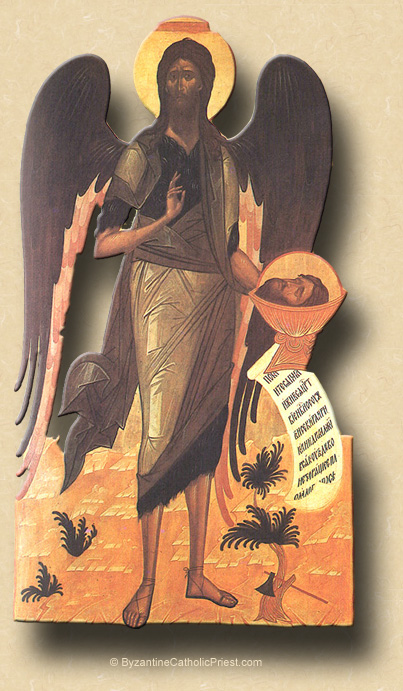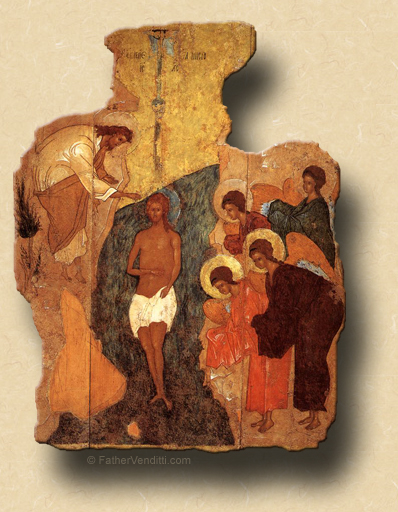Forget Saving the World; How About Saving your Soul?2 Timothy 4:5-8;
Mark 1:1-8. The Sunday before Theophany. The Holy Martyrs Theopempt & Theona. Our Venerable Mother syncletica. The Holy Prophet Micah.
Return to ByzantineCatholicPriest.com. |
11:34 AM 1/5/2014 — You may remember a homily I preached to you last October about watching television news; and, in a candid moment I mentioned how I fell into the trap of watching too much cable news simply because I don't move around so well and tend to just park myself in front of the tube—which is no longer a tube, so I suppose that particular colloquialism will soon pass out of usage. One of the other inconveniences of my condition is that there is no such thing as a comfortable position for sleeping; so, to make me sleep they give me medicine. And it works like a charm, so well that I don't even take half of what's prescribed and I'm out like a light. The problem is I'm also out like a light for most of the next day as well; so, I can't take it on a night before I have to serve in church. That's why I'm not available to you on Mondays, because after I'm done in church I take my medicine and hibernate 'till Tuesday.
And on that night before church you can only say so many prayers, read so many books and do so much work before you succumb to the temptation to turn on what used to be the tube. And you've only got three choices: infomercials, an NCIS marathon or preachers. I find the preachers the most entertaining, and if you've ever been up late at night with nothing to do I'm sure you've seen some of them.  What fascinates me about them is how fluid the meaning of the Holy Gospel can be with some of them; and, in some cases it seems you don't even have to believe in anything in particular: if you look hard enough you'll find a preacher that will seem to be saying what you want him to say, or think you want him to say. What fascinates me about them is how fluid the meaning of the Holy Gospel can be with some of them; and, in some cases it seems you don't even have to believe in anything in particular: if you look hard enough you'll find a preacher that will seem to be saying what you want him to say, or think you want him to say.
This situation is nothing new in the history of religion. In fact, this sort of thing was going on full force at the time Jesus began his public ministry. Palestine, at the time of our Lord, was a hot bed of holy men, so much so that the commander of the Roman Legion in Jerusalem once remarked that if he had as many troops in his legion as there were prophets and saints running around in the desert, he could conquer the whole world. I'm certain that that's an exaggeration on his part.
Knowing this history should give us a different kind of perspective when we read the Gospel lesson for today; because, it alerts us to the fact that when John the Baptist—and, later, our Lord—appear on the scene and begin their preaching, they are not unique, at least not in the fact that they are in the desert preaching. The Palestinian Jews and their Roman guests were well used to seeing wandering prophets in the desert. This was a fairly common phenomenon. It should give us pause to think about it because, if itinerant holy men were so much a part of every day life, and if the people were so used to seeing them, then what was it that made John the Baptist stand out so clearly in history? He isn't just mentioned in the Bible: the Jewish historian Josephus, who wrote a history of the Jewish people during the reign of Claudius, mentions John quite prominently, and also our Lord. For some reason, John made an impact, so much so that he was arrested—something that had never happened before—and was ultimately executed, as the Holy Gospel testifies.
What made John stand out from among the ranks of Palestine's corps of desert preachers was what he had to say. Most of the desert prophets spent a lot of their words addressing the situation at hand, namely, Roman occupation. Some of them even had bands of followers committed to various political agendas formed around the preaching of their chosen prophet. Judas Iscariot, so the Gospel tells us, was a member of one such band before he met our Lord. Normally, these kinds of people focused on the problem of the military presence in what the Romans called the province of Galilee. But John was different. He didn't talk about the Romans, nor about freedom for Israel, nor about liberation from military rule. Instead, he preached that people should repent of their sins and change their lives. His message did not address the global situation such as it was, but the situation within each man, the state of his soul, how he stood personally before God. And he targeted the leaders of his own religion, not because he challenged their authority, but because he felt they had, themselves, focused so exclusively on the political situation with Rome that they had neglected the spiritual realities which he believed were so much more crucial. His baptism of repentance became a symbol for those who had cast aside the affairs of this life to focus on what our Lord would call, a couple of years later, the "one thing necessary" (cf. Luke 10:39-42): the state of one's soul before God. And the reaction of many of these people to John's preaching is typical, and we often see remnants of it today, especially when someone criticizes the religious point of view as trite, or some "pie in the sky" stuff that is not relevant to the modern situation nor answers the needs of today. And for those who could not see beyond the practical concerns of life, John's preaching was very confusing. They did not understand it; and, typical of men in authority, what they don't understand or can't figure out they ultimately begin to fear as a threat. This is what led to John's death, and what ultimately contributed to our Lord death on the cross three years later.
And here we can see the wisdom of the Fathers of the Church who, with the active participation of the Holy Spirit, passed on the liturgical traditions to which our particular Church still clings: all those readings from St. Paul we obsessed over during Philips Fast, with their rantings about Satan and evil; the correlation between celebrating the Nativity of our Lord and anticipating our own final judgment. Now we celebrate this Sunday Before Theophany, and the life and death of the Baptist fits right into the scheme. We know that the Theophany is the beginning of our Lord’s public life;—his active presence among us—and, in celebrating it, we must be mindful of preparing ourselves for the second coming of our Lord as the divine judge who will separate forever the living from the dead.  The coming feast is designed to remind us that, as we prepare ourselves to celebrate Christ’s first Theophany, so we should prepare our souls to receive his second. The coming feast is designed to remind us that, as we prepare ourselves to celebrate Christ’s first Theophany, so we should prepare our souls to receive his second.
There is somewhat of a misconception that the Early Church did all it's baptisms at Easter time. Certainly there were baptisms done at that time; but, the earliest evidence is that the first Christian communities baptized mostly on Theophany in imitation of our Lord's own baptism by John. And to this day we mark the feast of the Theophany with the blessing of water. The priest blesses the church and then blesses us with the water, then we take the Theophany water to our homes as a means of taking God with us into our lives. But that water is not meant to be some kind of lucky charm that we take home to protect us from evil—that would not be faith, that would be superstition. We take the water home with us as an expression of our desire that God make his home within us, which only happens when we live Godly and holy lives. Being blessed with the water of the Theophany does not make us holy. It’s being holy that makes the blessing with the water of the Theophany mean something.
And since we've been focusing so much on St. Paul these past few months, we might as well conclude our thoughts today with him and the very brief Apostolic reading presented to us today from his Second Epistle to Timothy, which sums up everything we've been saying so beautifully as only St. Paul can do. Timothy was a close friend of Paul's who had traveled with the Apostle on his first missionary journey and had even been arrested with him, so they were old cell mates. When Paul established the Church in Ephesus, he made Timothy the bishop there; but, Timothy was very young, perhaps too young to have been made a bishop, and the people there rejected him; so, Paul wrote this letter to encourage him. It's Paul's last letter; in fact, he's under arrest again when he writes it. He writes it in transit as he's being taken to Rome to be tried for treason, so he knows that he will soon be dead, and the subject of his own eternal judgment, to which the Theophany points us, is on his mind. His advice to Timothy is practical enough, encouraging him to plod along with his priestly duties and embrace his suffering as participation in Christ's, but it causes him to reflect on his own imminent death, and these are the reflections which are prescient for us as we prepare to celebrate the Theophany. Again, I give you Msgr. Knox's translation because it is so clear and expressive:
It is for thee to be on the watch, to accept every hardship, to employ thyself in preaching the gospel, and perform every duty of thy office, keeping a sober mind. As for me, my blood already flows in sacrifice; the time has nearly come when I can go free. I have fought the good fight; I have finished the race; I have redeemed my pledge; I look forward to the prize that is waiting for me, the prize I have earned. The Lord, the judge whose award never goes amiss, will grant it to me when that day comes; to me, yes, and all those who have learned to welcome his appearing (2 Tim. 4:5-8).

|

